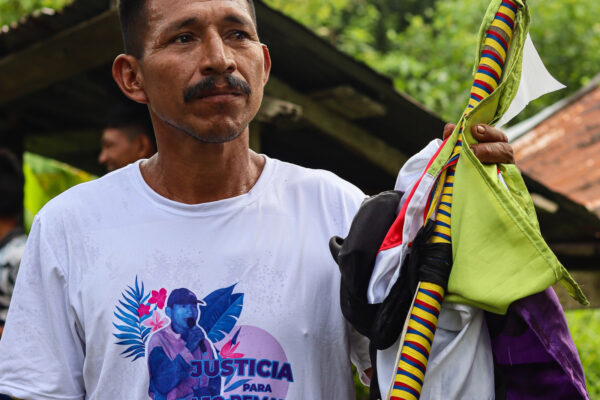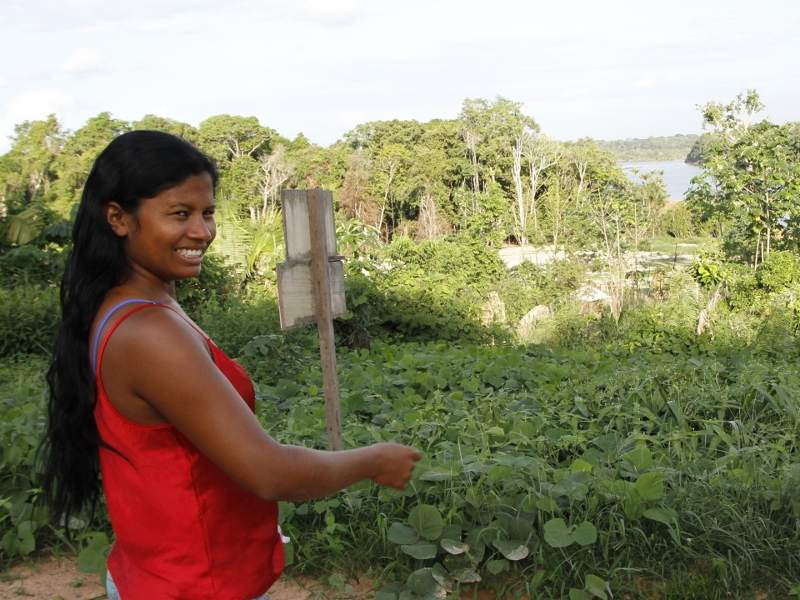
“I know that tomorrow nothing will be like it was before”
Milton Nascimento
“Before, in the past, we had a life. Now we have our appointment books,” pronounces Leilane Juruna, who goes by the nickname “Bel.”
The Juruna are an indigenous tribe in the Xingu River basin. Bel is the Vice-Mayor of the Juruna Muratu village in the Paquiçamba Indigenous Territory, located on the “Big Bend” (Volta Grande) of the Xingu River in Pará state.
Bel speaks to us from her new house made of wood, identical to 15 others, constructed by the Norte Energia Consortium as part of the Indigenous Component of the Basic Environmental Project (PBA-CI), legally mandated under the licensing of the Belo Monte hydroelectric dam. From her house, Bel is making artisanal handicrafts as she sits in front of the television, but takes a pause to give us a chance to take a walk and talk.
Everything – the appointment book, the house, the television, and even her artisanal handicrafts – make up part of what she terms “our former life,” the life of the indigenous peoples affected by and partially compensated with the shock of modernization from the hydroelectric dam on the Xingu River.
Recapping the last years in her area, Bel recalls that the first change in the life of the Juruna tribe from Muratu commenced with the start of an intense – and tense – process of negotiation with Norte Energia, responsible for the dam’s construction, as well as with government bodies. It was a negotiation on the conditions of Belo Monte.
Their “life” came to be swallowed up by an unending sequence of meetings, which dragged the residents away from their daily responsibilities. “We had an appointment and meeting every day, all day,” reports Bel. “There wasn’t any more time left to fish, to live. We began to have a bit more money.” (Before the approval of the PBA indigenous agreement, Norte Energia passed on monthly stipends to the value of R$ 30 million (US$ 7.7 million) for each area affected by the hydroelectric dam.)
“This changed our ability to feed ourselves, and what we ate. Previously, our basic diet was fish that we fished from the river and manioc flour we grew. Without time to produce this food, we began to buy everything from the market. We had so many meetings to defend our land, rights, and future that we didn’t have time to go back home and cook lunch. So, my children began to eat noodles because that was the only thing that they knew how to cook themselves,” Bel recounts.
The most immediate, and most worrying, impact of the change in the ways the indigenous get food is the community’s still-rising cholesterol levels, which have gone through the stratosphere.
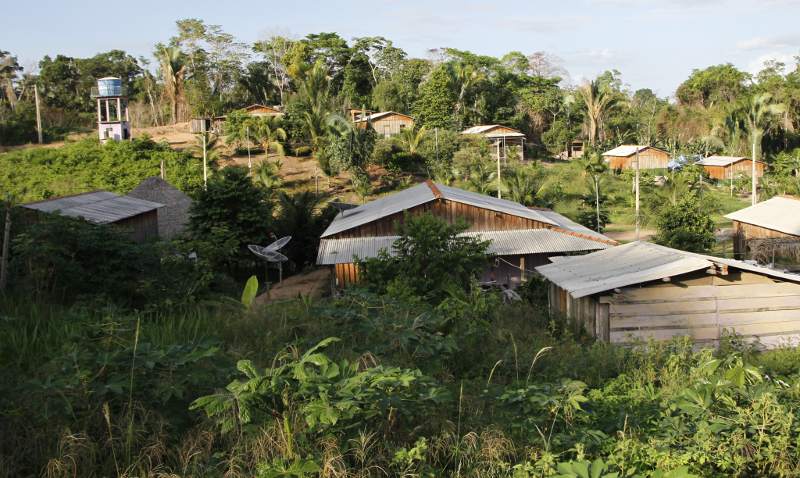
As far as her new house, Bel doesn’t have complaints. The only problem is that there’s no bathroom, a subject that continues to be on her agenda because the house’s tanks leak waste into the Xingu River, which flows to the banks of the community, depending on the levels of accumulation of water in the soil. At present, the community’s “needs” in this respect are fulfilled by going into the forest.
But the biggest problem with regards to the new houses is the electricity bills associated with them. Long a demand of the Juruna indigenous community, energy came to Muratu in September 2015.
Before, the Juruna were to be supplied with energy from generators paid by Norte Energia, but there weren’t sufficient funds to do so. Now, what was a dream has turned into a nightmare. First, the supply cuts constantly because the wiring passes through the forest’s edge and “any branch falling ends up damaging the structures.”
Secondly, the coming of electricity to the community brought drawbacks. As Bel recounts, “I myself have an accumulated debt of R$ 330 (US$ 85) on my account from the last 4 months, and they already informed me that they’re going to cut off my electricity. But this is nothing compared to the bills of my sister-in-law and my cousin, who in only one month received charges of R$ 300 and R$ 550 each.
“These people from Norte Energia come on our land, make an enormous dam, and now we have to pay!” says Bel indignantly. This subject, too, is on the “agenda.”
From the River to the Land
The most drastic change in Bel’s life, however, was the obliteration of her ancestral identity and the imposition of a new identity when she was compelled to transform from a fisherwoman into a farmer. Putting to the side the beading that she is making into a necklace, she shows her small brown hands. “It was like this: my grandfather, my father, all of us always lived on the river the whole day, fishing for acari.” The acari is a small ornamental fish, endemic to the Xingu River, that the Juruna would catch and sell to become aquarium fish.
But this life is no more, as Bel explains: “There aren’t fish any more. We would go out for days on boats. We would camp on the islands, we’d dive in. It was happiness. The traders would come in search of the acaris, and they’d bring merchandise from the city that our people needed. We also would fish to eat, of course.
“Now, after a lot of meetings, we negotiated with Norte Energia for a project to raise hens. Each of us received a chicken coop with 50 birds, and the company gave us vaccines and feed. I think the idea is to produce eggs. But what kind of money does selling eggs make? And these hens are strange, because when one of them lays an egg, the others all run there and devour it.”
“And they gave us corn seeds for us to raise crops, because after picking up the initial seeds, they are not going to give us any more feed. And I don’t know how to do this, raising crops. My hand hurts and gets hot. We are planting corn, manioc, pineapple, watermelon, but we are not used to this.”
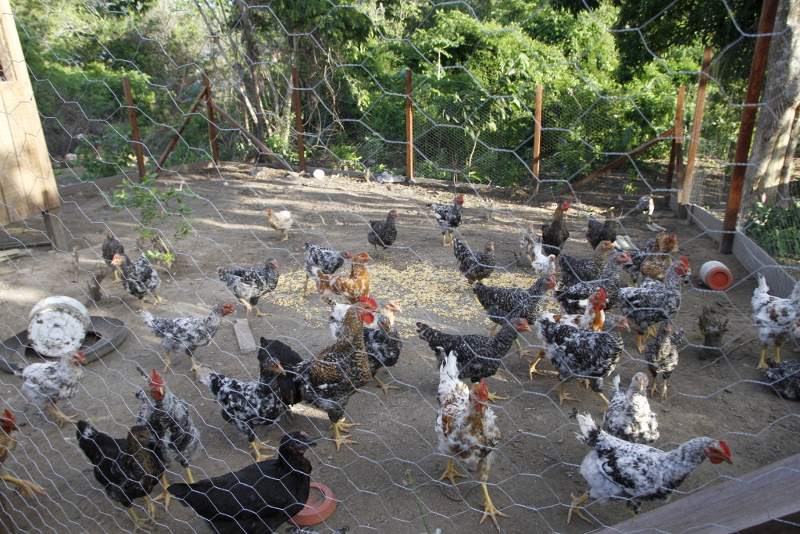
In addition to the heat, the awkwardness of working with the hoe, and the painful loss of living on and diving in the river, there is one more thing that’s new that is even more painful and frightening: the rising infestation of mosquitoes.
On the riverbank, Bel shows the rocky edges where, at this time of year, the Amazonian winter, usually a time of enormous rains, the water already should have covered more than 10 meters of the Xingu river slopes that are now dry. Once the Belo Monte bypass channel was finished, which diverts the river waters through the dam turbines, the prediction that 100 km of the Xingu River were going to dry has indeed become a reality.
It’s in the exposed rocks and in the stagnant standing water that, according to Bel, the insects proliferate. “Just now, we’ve spent a week without going into our garden rows because of the mosquitoes. It was impossible to stay out there. The attack was unbearable.
Even today the children had to stay underneath the mosquito net inside the house. Even the settlers, who live far from the river and never had problems, now can’t withstand the mosquito bites here. There even is a case, in a neighboring village, where it seems that a baby died of poisoning from so much repellent that they were using inside the house.”
The insect attack has been so intense that Bel, without knowing, is confirming a somber prediction of the Federal Public Prosecutors Office (Ministério Público Federal), pronouncing: “If it continues this way, we will have to abandon this earth of ours.” To reinforce this, she points to the place where Norte Energia is constructing a school and health clinic. “I think it’s good, but I can’t help thinking that going forward with construction of this school and health clinic is a waste of money if we can’t manage to remain here.”
At this time, another source of sadness for the indigenous Juruna community here is having to stop using the motorboats that the received as part of the legal compensation agreement made by Norte Energia. As predicted, the now constant emergence of the river rocks makes river navigation more difficult, and, according to Bel, the Jurunas are having to resort to paddling canoes.
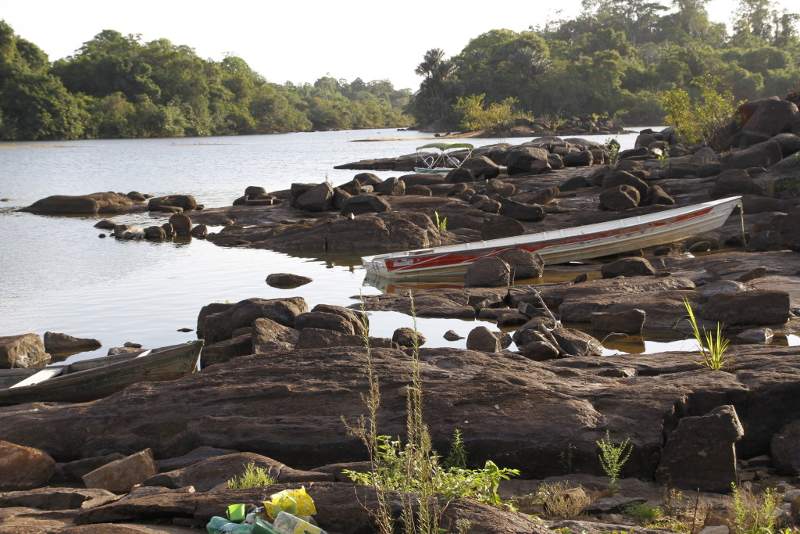
The Losses
Seated on a rock that should already be covered by the river at this time of year, Bel becomes saddened. She shows a strip of trees on the edge of the river that, for their life cycle, depend on the flood pulses of the Xingu in order to survive, bear fruit, and, with their fruits, feed the fish in the river.
“Without water,” she explains, “all this vegetation on the Xingu will die.”
And the fish?
Yes, of course. She recounts that many of the fish also are being attacked by an illness that makes them putrefy – the fish are rotting while alive. You touch them and the tail falls off, she explains. “But we too are catching a fungus. We go bathe in the river and then marks appear on our skin.”
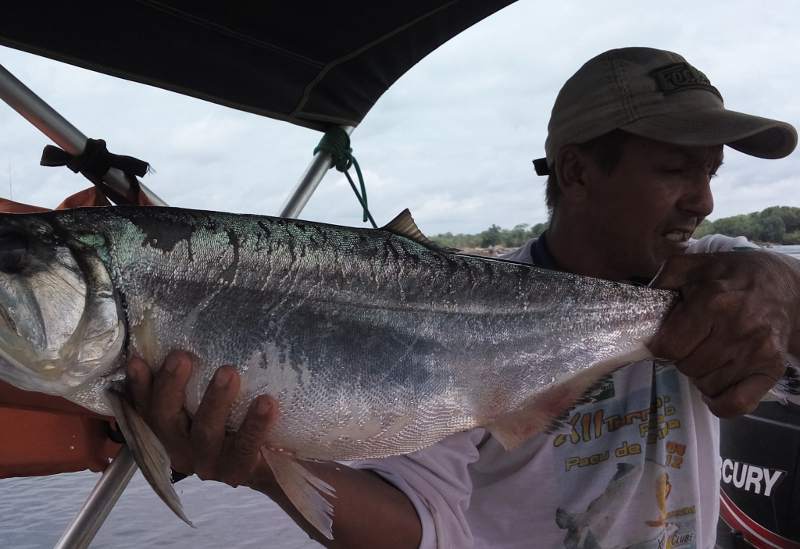
Now in the forest, the fear is about the Brazil nut trees that have ceased producing. “I think it’s because of the bees that pollinate the Brazil nut trees. The bees have suffered a lot with the constant lights of the Belo Monte dam construction. Three years and the trees haven’t produced any nuts. Only just recently the trees started to give a very little bit of nuts,” Bel explains.
From one agenda to the next, from new houses to hen coops, from the hen coops to the garden rows, from the garden rows to televisions: modernity taken notice and given new shape to life in the village of the Juruna Indians of Muratu.
Responding to praise for her bead necklace, Bel smiles and explains: “I’m making these to build up a stock, because the whole year the Social-Environmental Institute (Instituto Socioambiental) promotes these guided canoe expeditions for people to understand the challenges we are going through on the Xingu River. A lot of tourists come here, and they like to buy handicrafts.” Night is falling, the full moon bulges, and the televisions in the new houses continue with their uninterrupted, monotonous murmur.
Translated by Tiffany Higgins



